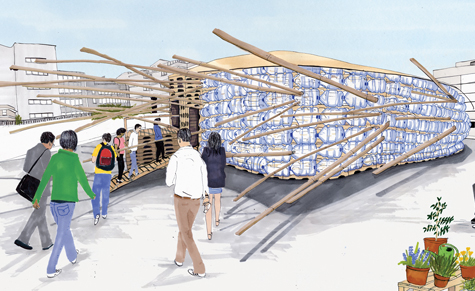The Jellyfish Theatre by Kobberling and Kaltwasser

Receive our daily digest of inspiration, escapism and design stories from around the world direct to your inbox.
You are now subscribed
Your newsletter sign-up was successful
Want to add more newsletters?

Daily (Mon-Sun)
Daily Digest
Sign up for global news and reviews, a Wallpaper* take on architecture, design, art & culture, fashion & beauty, travel, tech, watches & jewellery and more.

Monthly, coming soon
The Rundown
A design-minded take on the world of style from Wallpaper* fashion features editor Jack Moss, from global runway shows to insider news and emerging trends.

Monthly, coming soon
The Design File
A closer look at the people and places shaping design, from inspiring interiors to exceptional products, in an expert edit by Wallpaper* global design director Hugo Macdonald.
In six weeks' time, the curtains will go up on London's first fully functioning theatre made from recycled materials. Located in a school playground in Southwark, the Jellyfish Theatre is being rigged up from wooden pallets and discarded materials for which its creators, Berlin architects Martin Kaltwasser and Folke Köbberling, have spent weeks scavenging. Wallpaper* caught up with Martin Kaltwasser on site.
How did this project come about?
Alternative theatre company The Red Room wanted a venue in which to show environmentally-themed productions and teamed up with the Architecture Foundation to invite me to build the theatre. I have spent the past 20 years creating artworks and installations all over the world using reclaimed materials, but this is my biggest project to date.
Tell us about the theatre.
The theatre is shaped like a jellyfish which obliquely references a fragile creature in a fragile environment. Its 'eyes', made from plastic bottles decorated by local school children, will be the lobby, its wooden tentacles the backstage area, and it will seat 110 people. Everything will be recycled at the end.
What materials are you using?
As it turns out, mainly pallet crates collected from New Covent Garden Market, but with every project we use what we can find. Function follows form. It has been extremely difficult getting materials - which is crazy given we are surrounded by gigantic construction sites. We made many journeys in our lorry to places around London only to come back almost empty-handed. This culture of fear that exists in London is a shock. The restrictions have astonished us; it's been like jumping into a sea of sharks. It's sad too, that we have not been allowed to build without scaffolding as this goes against my philosophy.
Receive our daily digest of inspiration, escapism and design stories from around the world direct to your inbox.
Where else do you work?
My wife and I are based in Berlin, where this sort of project is almost too easy. The city is still full of gaps and non-defined space and getting materials is no problem. We have just spent a year in LA where we lived with no car and lectured at the Pasadena College of Design. Next we go to Vancouver to teach and create an artwork called 'When the Hosts Come Home' using the leftovers from the 2010 Olympic Village. The luxury apartments were seemingly so expensive that after they were built, they were covered with MDF-like boards to prevent resident athletes from damaging them. We are using these boards in our public sculpture.
Emma O'Kelly is a freelance journalist and author based in London. Her books include Sauna: The Power of Deep Heat and she is currently working on a UK guide to wild saunas, due to be published in 2025.